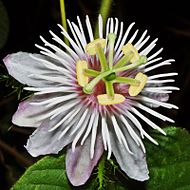This is a listing page for Passionflower (Passiflora) products available directly from producers:
Location: Karnataka, India
Harvest Season: depends on plant part
Acres: 50
Certifications:
Good Agricultural Practices
Uses Organic Practices
Non-GMO
Farmer name: Sushil G.R.
Family Operated: Yes
Years in Operation at site: 50+
Asking price:
Flower: 300 INR/kg (shade-dried on-site)
Vine (stem): 65 INR/kg (cut and shade dried)
Seed: Inquire
Purchase Material: E-Commerce In Progress
Shipping: FOB Bangalore
Product Listing #: 389174
Passion Flower in Kerala, India:
Traditional use of Passionflower (Passiflora) (Wikipedia):
Passiflora, known also as the passion flowers or passion vines, is a genus of about 500 species of flowering plants, the type genus of the family Passifloraceae.
They are mostly vines, with some being shrubs, and a few species being herbaceous. For information about the fruit of the passiflora plant, see passionfruit. The monotypic genus Hollrungia seems to be inseparable from Passiflora, but further study is needed…..
P. incarnata (maypop) leaves and roots have a long history of use among Native Americans in North America and were adapted by the European colonists. The fresh or dried leaves of maypop are used to make a tea that is used for insomnia, hysteria, and epilepsy, and is also valued for its analgesic properties.[12][medical citation needed] P. edulis (passion fruit) and a few other species are used in Central and South America for similar purposes. Once dried, the leaves can also be smoked.
The medical utility of only a few species of Passiflora has been scientifically studied.[13] In initial study in 2001 for treatment of generalized anxiety disorder, maypop extract performed as well as oxazepam but with fewer short-term side effects.[14] It was recommended to follow up with long-term studies to confirm these results.
A study performed on mice demonstrated that Passiflora alata has a genotoxic effect on cells, and suggested further research was recommended before this one species is considered safe for human consumption.[15]
Passionflower herb (Passiflorae herba) from P. incarnata is listed in the European Pharmacopoeia. The herbal drug should contain not less than 1.5% total flavonoids expressed asvitexin.[citation needed]
Passionflower is reputed to have sedative effects and has been used in sedative products in Europe, but in 1978, the U.S. Food and Drug Administration prohibited its use in over-the-counter sedative preparations because it had not been proven safe and effective. In 2011, the University of Maryland Medical Center reported that passionflower “… can trigger side effects and can interact with other herbs, supplements, or medications. For these reasons, you should take herbs with care, under the supervision of a health care provider.”[16][17]
Passionflower is classified as generally recognized as safe (GRAS) for use in foods in the US,[18] and is “possibly safe when used orally and appropriately for short-term medicinal purposes,” “possibly unsafe when used in excessive amounts,” but unsafe when used orally during pregnancy since “…passionflower constituents show evidence of uterine stimulation.” The database suggests it is possibly effective for adjustment disorder with anxious mood, anxiety, and opiate withdrawal, but it “can cause dizziness, confusion, sedation, and ataxia” and there are some reports of more severe side effects including vasculitis and altered consciousness.

